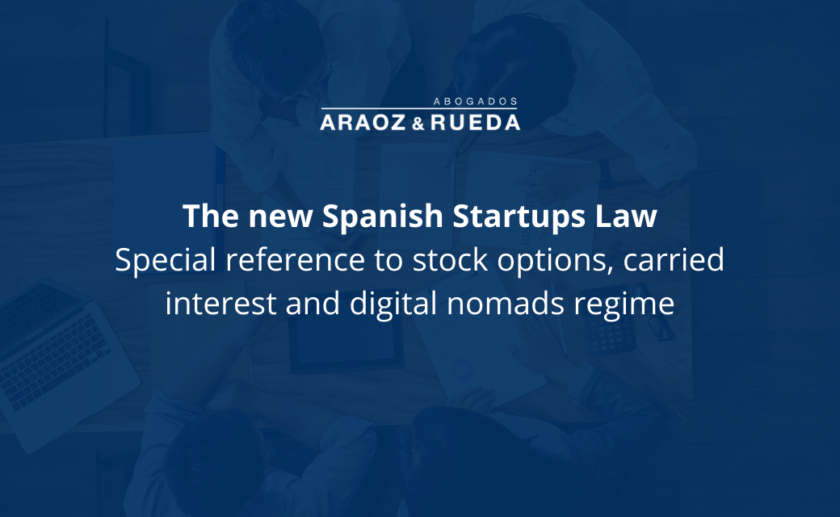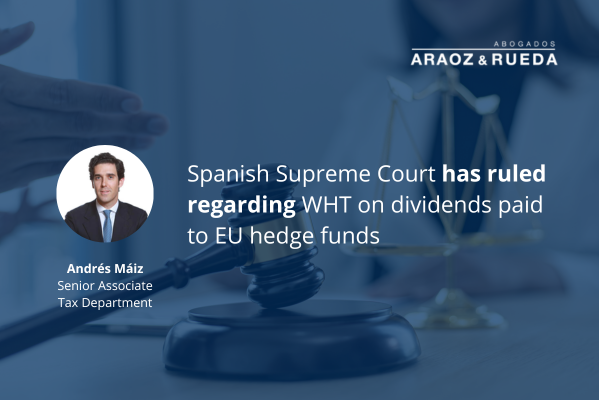Following the declaration by the Spanish Government of the state of alarm on 14 March 2020, a series of economic and social measures were adopted to tackle the health crisis resulting from the COVID-19 pandemic, through the adoption of several Royal Decree-Laws. Some of these are listed below:
(i) Royal Decree-Law 8/2020, of 17 March, on urgent extraordinary measures to deal with the economic and social impact of COVID-19 (“RDL 8/2020”). Among other measures, pursuant to RDL 8/2020 the creation of a line of guarantees (avales) on behalf of the Spanish State was approved, of up to 100 billion euros, which is channeled through the Official Credit Institute (“ICO”). This line was aimed at supporting companies and the self-employed, and was also followed by the extension of the ICO’s net debt limit.
The measures promoted by this Royal Decree-Law were further complemented by Royal Decree-Law 25/2020, of 3 July, on urgent measures to support economic recovery and employment (the “RDL 25/2020”), increasing the budget of the public guarantees (avales públicos) up to140 billion euros.
(i) Royal Decree-Law 16/2020, of 28 April, on procedural and organizational measures to address COVID-19 in the Justice Administration (“RDL 16/2020”). RDL 16/2020 directly affected the field of insolvency proceedings, with measures that focused on providing more flexibility to the situation of debtors in compliance with an approved composition or refinancing arrangement.
(i) Law 3/2020, of 18 September, on procedural and organizational measures to address COVID-19 in the field of the Administration of Justice (“Law 3/2020”). This Law repealed RDL 16/2020 and adapted the measures taken therein to the new context, extending in some cases the deadlines for their application and introducing additional measures. One of the main measures introduced by Law 3/2020 was the suspension, until 14 March 2021, of the obligation to request the declaration of insolvency proceedings.
(i) Royal Decree-Law 34/2020, of 17 November, on urgent measures to support business solvency and the energy sector, and on tax matters (“RDL 34/2020”). RDL 34/2020, among other amendments, extended the maturity and grace periods for transactions guaranteed by the ICO, and amended or extended some of the insolvency reforms that had been promoted by Law 3/2020.
Given that the effects of the health crisis continue to severely affect Spanish economy, on 13 March 2021 the Royal Decree-Law 5/2021, of 12 March, on extraordinary measures to support business solvency to tackle COVID-19 pandemic (“RDL 5/2021”) was published in the Official State Gazette (Boletín Oficial del Estado). The following is an analysis of the main measures and amendments introduced by this RDL 5/2021.
1. Creation of aid funds
RDL 5/2021 creates three aid funds intended for viable companies and the self-employed whose financial situation has deteriorated due to the pandemic. In particular, it approves the creation of the following aid resources:
a. Line for direct aid to the self-employed and companies (Title I of RDL 5/2021)
On the one hand, a direct aid line is created, with a budget of 7 billion euros (2 billion of which will correspond to the regions of the Balearic and Canary Islands). This line will be aimed at providing direct aid to the self-employed and companies whose income has decreased by more than 30% in 2020 against 2019.
The aid granted under this line has an intended nature. In particular, in accordance with Article 1.3 of RDL 5/2021, these aids must be aimed at complying with payments to suppliers and other creditors (financial and non-financial), as well as at covering the fixed costs incurred (employment or supplies, among others), provided that they have accrued between 1 March 2020 and 31 May 2021, and that they come from agreements entered into prior to the entry into force of the Royal Decree-Law.
In addition, payment to suppliers must address first and, if appropriate, the reduction of the principal amount of bank debt, where the reduction of the principal amount of debt with a public guarantee (aval público) will be prioritized.
b. COVID Financial Debt Restructuring Facility and Code of Good Practice (Title II of RDL 5/2021)
On the other hand, RDL 5/2021 approves the creation of a second aid line, referred to by the legislator as the “COVID financial debt restructuring line”. This second line has a budget of 3 billion euros and is aimed at making loans with public guarantees more flexible, allowing – among other measures – the ICO to join the refinancing and restructuring proceedings agreed between financial institutions and their clients.
Thus, on the basis of the specific financial institution’s analysis of given customer, measures may be agreed to extend the maturity of publicly guaranteed loans for an additional period, and to convert publicly guaranteed loans into participating loans (both on terms to be determined by a Council of Ministers’ Agreement and, therefore, still to be defined).
In addition, this Title of the RDL 5/2021 refers to the Code of Good Practices, the content of which is pending approval by the subsequent Council of Ministers. In this regard, companies and the self-employed that comply with the requirements established therein will be suitable to receive wire transfers made by the Ministry of Economic Affairs and Digital Transformation in order to reduce the outstanding principal of financial transactions with public guarantee (aval público).
As mentioned in the beginning of this section, the budget allocated to the Ministry of Economic Affairs and Digital Transformation to carry out these transfers amounts to 3 billion euros.
Finally, the Third Final Provision of RDL 5/2021 amends RDL 8/2020 and extends until 31 December 2021 the deadline for applying for loans with a public guarantee.
c. Companies recapitalization fund (Title III of RDL 5/2021)
Moreover, the fund for the recapitalization of companies affected by COVID-19 (a fund without legal standing, managed by the state trading company Compañía Española de Financiación del Desarrollo, COFIDES, S.A., S.M.E.), with a 1 billion euros budget, has been created.
The fund aims at strengthening the financial situation of companies that were viable before December 2019, but are facing solvency problems due to the pandemic.
The aid will be instrumented through debt, equity and equity hybrid instruments, such as ordinary loans, equity loans, equity or others to companies in temporary difficulties that are not eligible for other aids from the solvency support fund for strategic companies.
In this regard, a prior viability and risk analysis will be carried out, in which the eventual debt restructurings that the potential beneficiary has carried out (including those provided for in Title II of RDL 5/2021, already mentioned above) will be assessed.
2. Insolvency measures
Together with the creation of aid funds described above, RDL 5/2021 introduces, in its Seventh Final Provision, amendments to Law 3/2020. The aim is to ensure that companies that are viable under normal market conditions have legal instruments that allow them to maintain their activity and employment until the pandemic subsides.
In particular, the following matters of Law 3/2020 are amended, among others:
a. Special regime for the declaration of insolvency proceedings
RDL 5/2021 extends the suspension of the duty to request the declaration of the insolvency proceedings. In particular, this suspension is extended until 31 December 2021, inclusive.
Until this date, judges will not admit applications for insolvency proceedings that have been filed since 14 March 2021. However, in the event that the debtor has filed an application for voluntary competition, this will be admitted with preference, even if it was filed after the date of the application for necessary competition.
b. Modification of the insolvency composition
In addition, the deadline by which the insolvent party may submit the proposal to amend the insolvency composition that is in the period of compliance is extended to 31 December 2021, inclusive. Prior to this amendment, the time limit was set at 14 March 2021.
In addition, the judge will not admit applications for a declaration of non-compliance with the insolvency composition filed between 31 October and 30 September 2021 until three months after the latter date. In the event that these applications were filed between 31 January 2021 and the entry into force of RDL 5/2021, the proceedings will be suspended until three months after 30 September 2021.
During these three months, the insolvent party may present a proposal for amendment of the insolvency composition, while the judge will suspend the non-compliance application proceedings and will attend the modification proposal as a priority.
Once again, RDL 5/2021 maintains the conventional insolvency regulations, but extends their deadlines, in order to provide more flexibility to companies affected by the pandemic.
c. Deferral of the duty to apply for the opening of the winding-up phase (fase de liquidación)
On the other hand, the suspension of the duty to request the liquidation of the aggregate assets (masa activa) is extended until 31 December 2021, in the event that the debtor is aware of the impossibility of complying with the payments committed or the obligations contracted after the approval of the insolvency composition, and provided that a proposal to modify the composition is submitted and admitted within the same term.
d. Refinancing agreements
In accordance with the previous measures, the deadline for modifying approved refinancing agreements that the debtor has in force is extended until 31 December 2021, whether or not one year has elapsed since the previous approval.
In addition, the judge will not admit the applications for a declaration of non-compliance with the refinancing agreement filed between 31 October and 30 September 2021, until one month after the latter date. In the event that these applications were filed between 31 January 2021 and the entry into force of RDL 5/2021, the proceedings will be suspended.
Finally, the debtor is granted a period of one month from 30 September 2021 to notify the court of the beginning of negotiations with creditors, in order to amend the agreement or to reach a new one. If, three months after this notification, the debtor has not reached an amendment agreement or a new agreement, the judge will lift the suspension of the applications for a declaration of default filed by the creditors.





